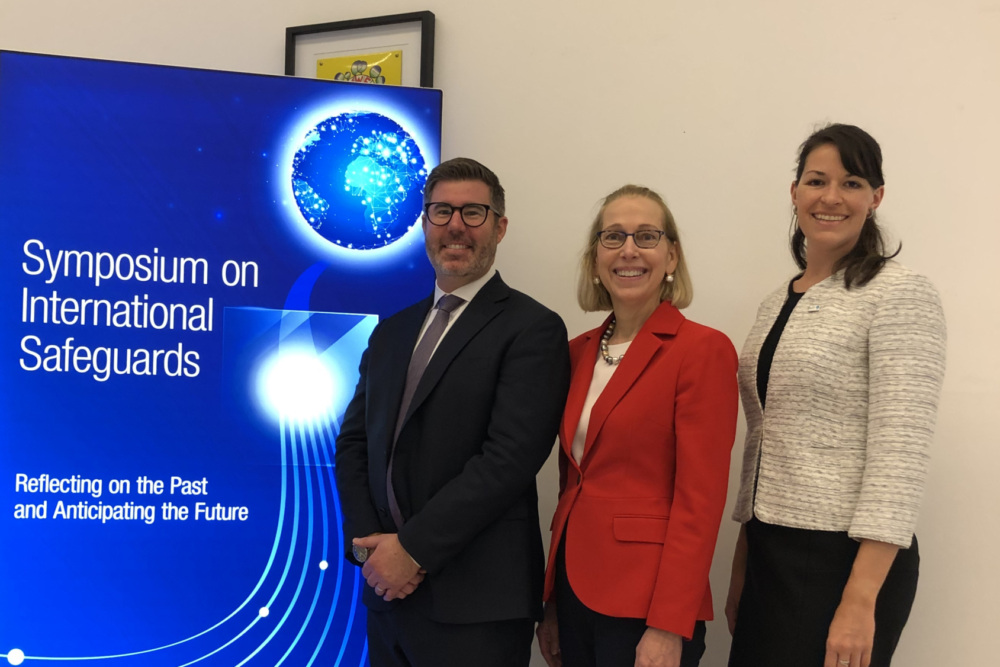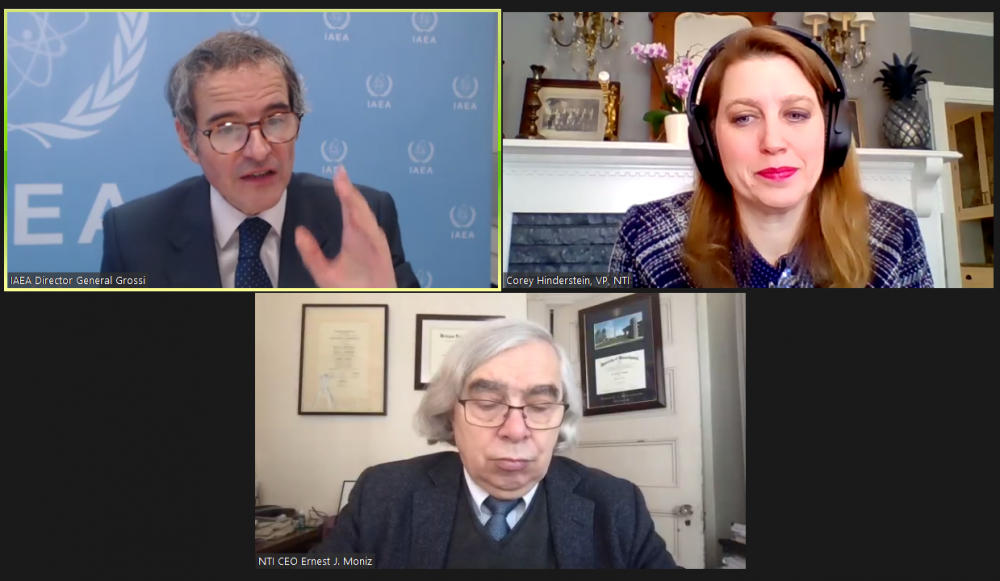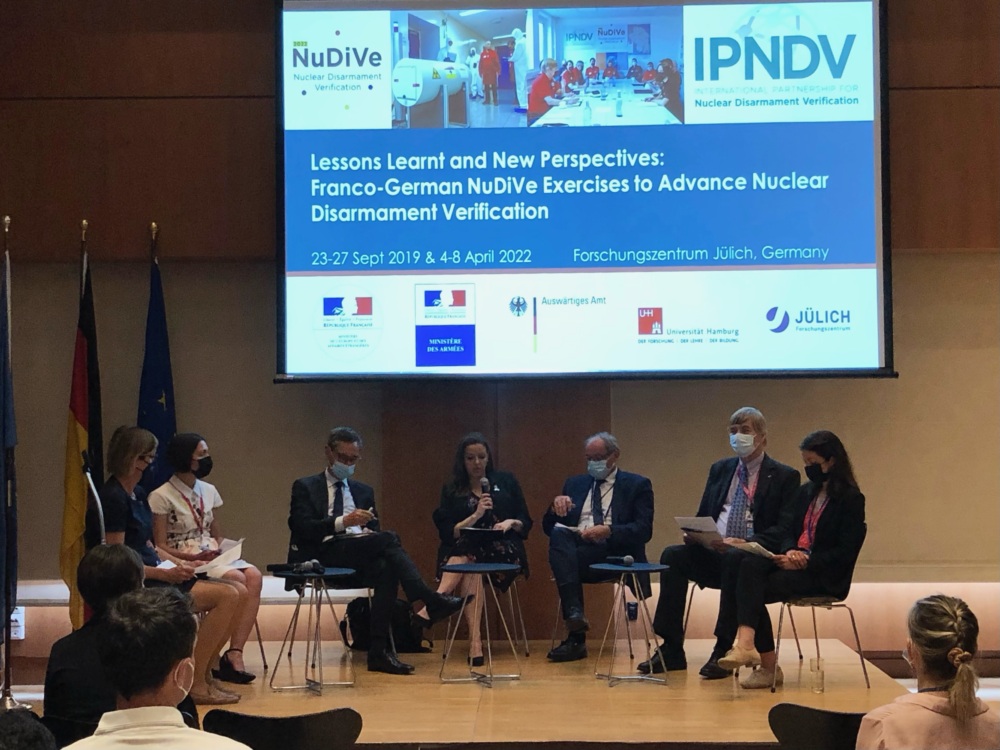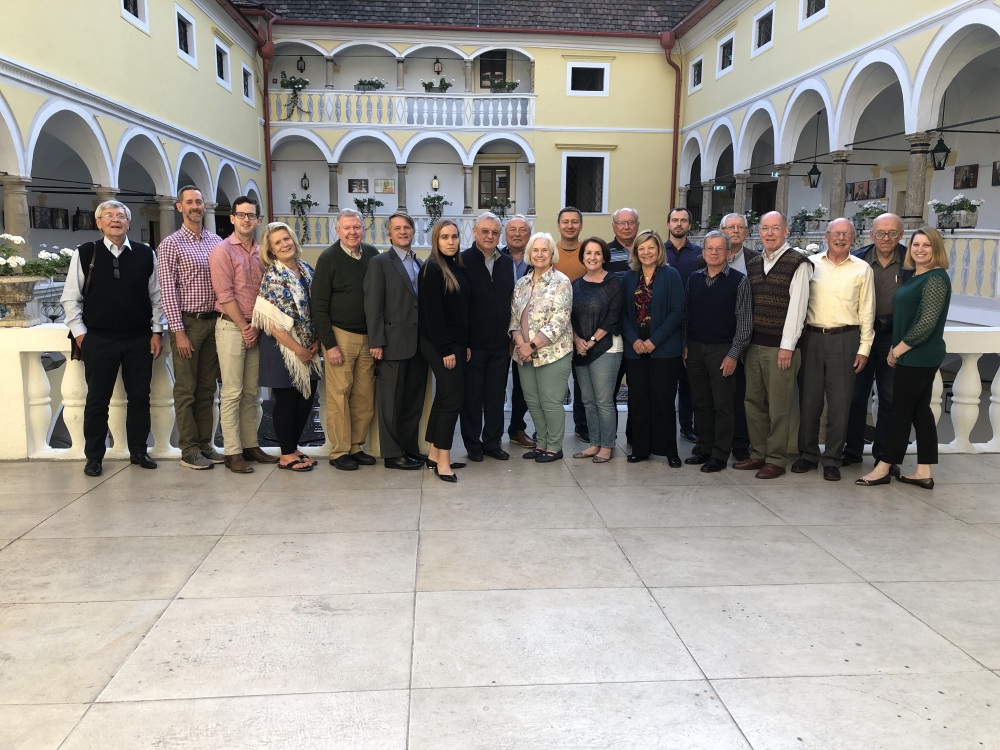
Celebrating the History of Nuclear Safeguards and Imagining The Future
NTI played a prominent role in this year’s IAEA Symposium on International Safeguards. Learn more about our what our experts were up to through this photo blog.
Atomic Pulse
This post was written by Marina Lorenzini, an intern with NTI’s International Fuel Cycle Strategies Program. She is currently an M.A. in Law & Diplomacy candidate at the Fletcher School at Tufts University.
“The IAEA, and international organizations in general, provide a service. The world does not live for us, we live for the world. So, the economy must grow, science must go forward, countries and people need betterment, they need more energy, and they need solutions. And, it’s up to us to find the safety, security, safeguards, and non-proliferation practices that will make all of that possible.” – IAEA Director General Rafael Mariano Grossi
In the latest virtual NTI Seminar, International Atomic Energy Agency (IAEA) Director General Rafael Mariano Grossi shared insights with more than 300 participants on the broad scope of IAEA activities, including the IAEA’s role in the Iran nuclear deal and details of his recent trip to Tehran, global nuclear security and safety, the COVID-19 response, climate change, and emerging technologies in nuclear energy.
The event, hosted by NTI Co-Chair and CEO Ernest J. Moniz and moderated by Corey Hinderstein, NTI’s vice president for International Fuel Cycle Strategies, was cited across international media outlets, including ABC News, CNN International, Reuters, and the Wall Street Journal.
Verification and Monitoring in Iran
Grossi headlined the NTI seminar less than 48 hours after he struck a three-month deal with Iran to limit the impact of Iran’s decision to suspend some of the IAEA’s access in Iran’s latest step away from the terms of the 2015 nuclear agreement. Grossi said he wrote to the head of the Atomic Energy Organization of Iran, Vice President Ali Akbar Salehi, after the Iranian Parliament in December passed a law to suspend some cooperation with the IAEA unless the United States lifted sanctions. Although the IAEA is not a party to the Iran deal, also known as the Joint Comprehensive Plan of Action (JCPOA), it plays a crucial role as the agency responsible for the verification and monitoring of the deal. As part of the JCPOA, Iran agreed to implement the IAEA’s Additional Protocol, providing important monitoring information about the country’s nuclear-related activities.
The result of the negotiations with Grossi established a temporary bilateral technical understanding, through which the IAEA will not lose critical data from verification and monitoring activities in Iran. This may allow for a more conducive diplomatic environment for all parties, especially the United States and Iran, to return to their JCPOA commitments. In 2018, under then-President Trump, the United States withdrew from the multilateral agreement and reimposed sanctions.
Grossi said a technical annex is in place to support the three-month agreement. “The annex is confidential,” he said. But generally, it “is a system that allows us to continue to monitor and register all of the key activities that are taking place throughout this period so that at the end of [this period], we can recover all of this information. In other words, we will know exactly what happened, exactly how many components were fabricated, exactly how much material was processed or treated or enriched, or so on and so forth.”
Without such an agreement, he said, “then everything is destroyed. There is no confidence anymore. We are back to square one. So, knowing what would have happened during three months is a small consolation.”
Grossi also remarked on the status of the Modified Code 3.1 of the Subsidiary Arrangements to a Safeguards Agreement, which requires parties, including Iran, to inform the IAEA about activities pertaining to the construction of nuclear facilities. “This is very important because we do know that there are such activities ongoing [in Iran] and many more that could come,” Grossi said. “We said, clearly and legally, that this type of agreement is inextricably linked to the normal safeguards agreement that they have. If [Iran does] something about this, they will be in violation of their normal safeguards agreement, which they themselves committed to continue to observe, which I specifically requested to be mentioned in the bilateral agreement.”
Separately, Grossi addressed the IAEA’s recent findings of unexplained uranium particles in Iran. “There are a number of points where Iran needs to reply regarding particles of uranium and other materials, which have been found in places where they shouldn’t be,” Grossi said. “The process is ongoing, and it has not yielded positive results for now. So, this is an activity that continues, and I will be reporting about that next week, when the Board of Governors of the IAEA meets for their spring session.”
Pandemic Response
Shifting gears to address other areas of responsibility for the Agency, Grossi shared ways in which the IAEA has contributed to global relief in the face of the COVID-19 pandemic. He emphasized that nuclear applications and science are a part of the toolbox available to member States. “We have helped 127 countries by providing them with RT-PCR tests, quick training, protective equipment, and tests,” he said.
Additionally, Grossi shared that, “we decided to work together with the FAO [Food and Agriculture Organization of the United Nations], WHO [World Health Organization], and the International World Animal Organization and put forward a program called Zodiac.” Zodiac (Zoonotic Disease Integrated Action) will use nuclear technology to help in the early detection of zoonosis, the transmittal of disease from animals to humans. Grossi called the IAEA’s on-site facilities, labs, scientists, and technologists a critical resource and said the capabilities should be significant in future partnerships with the FAO and WHO, which do not maintain such resources.
Climate Change
Moniz, who served as U.S. Secretary of Energy in the Obama administration and helped negotiate the Iran nuclear deal, also focused on climate change during the seminar, addressing the IAEA’s engagement on this issue in international fora. Moniz thanked Grossi for the IAEA’s role in raising the issue of nuclear energy at the 26th United Nations Climate Change Conference of the Parties (COP26) in Glasgow. “There are too many individuals, organizations, and countries that want to limit the conversation and exclude nuclear energy, carbon capture and sequestration, and negative carbon technologies,” Moniz said. “We need as much optionality as possible, and I think that having the IAEA out front in promoting that conversation, at least on the nuclear side, is critical.”
Grossi responded, “From the beginning of my tenure, I said that nuclear is part of the solution. Nuclear energy already provides 1/3 of the clean energy, which is produced all over the world. […] My first trip as Director General was to the Conference of the Parties of the Climate Change Convention […] in Madrid last year, and we were well received. And so, we are already working with the British organizers and we will be in Glasgow for the next conference, where we will be glad also to see the United States, having rejoined the Paris Agreement as an interlocutor of enormous importance. And, the IAEA is not the center of that debate, but it is saying [that] nuclear has a place at the table when it comes to the big problem of decarbonization of the global economy.”
Nuclear Security
In part, due to nuclear energy’s potential for low-carbon emissions energy production, nuclear energy is an increasingly attractive energy source. Thus, the industry continues to grow globally, and this fact raises the bar for nuclear security. Grossi remarked on both the present risks to materials and cyber infrastructure, saying, “we need to make sure that the national nuclear security infrastructures are up to speed. […] We need to adapt our efforts, and at the Agency, we are trying to do this.”
Moniz raised the four biennial Nuclear Security Summits, which ran from 2010 to 2016, noting that when he was Secretary, the Department of Energy encouraged the IAEA Ministerial Meetings to take over the Nuclear Security Summit’s role of convening senior leaders to make continued progress on nuclear materials security. He noted, however, that “in my experience at least, what we found was not complete enthusiasm among all of the members of the Agency, and I will be explicit, Russia, for example, being less enthusiastic about the nuclear security initiative, perhaps about the budgets.”
Moniz asked Grossi to expand on the Agency’s plans for getting past any obstacles that may inhibit progress on the nuclear security front. Grossi reflected that there are countries that “do not see nuclear security as something that should be at the forefront of the IAEA’s work. […] They may believe that this is something that can be dealt with internally satisfactorily without the need of a global effort. And, this is wrong because we know of the enormity of the challenge and because we know that the recourse to nuclear material for criminal purposes will most probably always be related to international criminality. […] This is the big challenge that we will be confronting in the next few years, where we will be working on advisory missions and on national programs.”
At the same time, Grossi expressed optimism: “What we see here at the Agency is an increasing demand for nuclear security infrastructure [and] nuclear security plans.”
Nuclear Safety and Emerging Technologies
Another significant area where Grossi has broken new ground is in conversations with private nuclear energy companies, where he has opened channels of communication to better understand new materials and technologies in the nuclear energy field. He said “the appearance of small, modular, medium-sized reactors [SMRs] is posing new questions in terms of safety and also of security. The IAEA, as the international hub for all of these discussions, is already looking into this, hand-in-hand with national regulators.” As Grossi shared, “several energy ministers from developing countries are enthusiastic about SMRs and the challenge for the IAEA is to look for a serious dialogue between industry and develop safeguards for these technologies.”
Watch the seminar here.
Sign up for our newsletter to get the latest on nuclear and biological threats.
NTI played a prominent role in this year’s IAEA Symposium on International Safeguards. Learn more about our what our experts were up to through this photo blog.
Diplomats and experts who met in New York last month to review implementation of the Treaty on the Nonproliferation of Nuclear Weapons (NPT) had an opportunity to learn more about a groundbreaking partnership working to pave the way for future progress on the reduction and elimination of nuclear weapons.
NTI-CENESS Joint Report Offers Recommendations to Strengthen the IAEA Safeguards System


